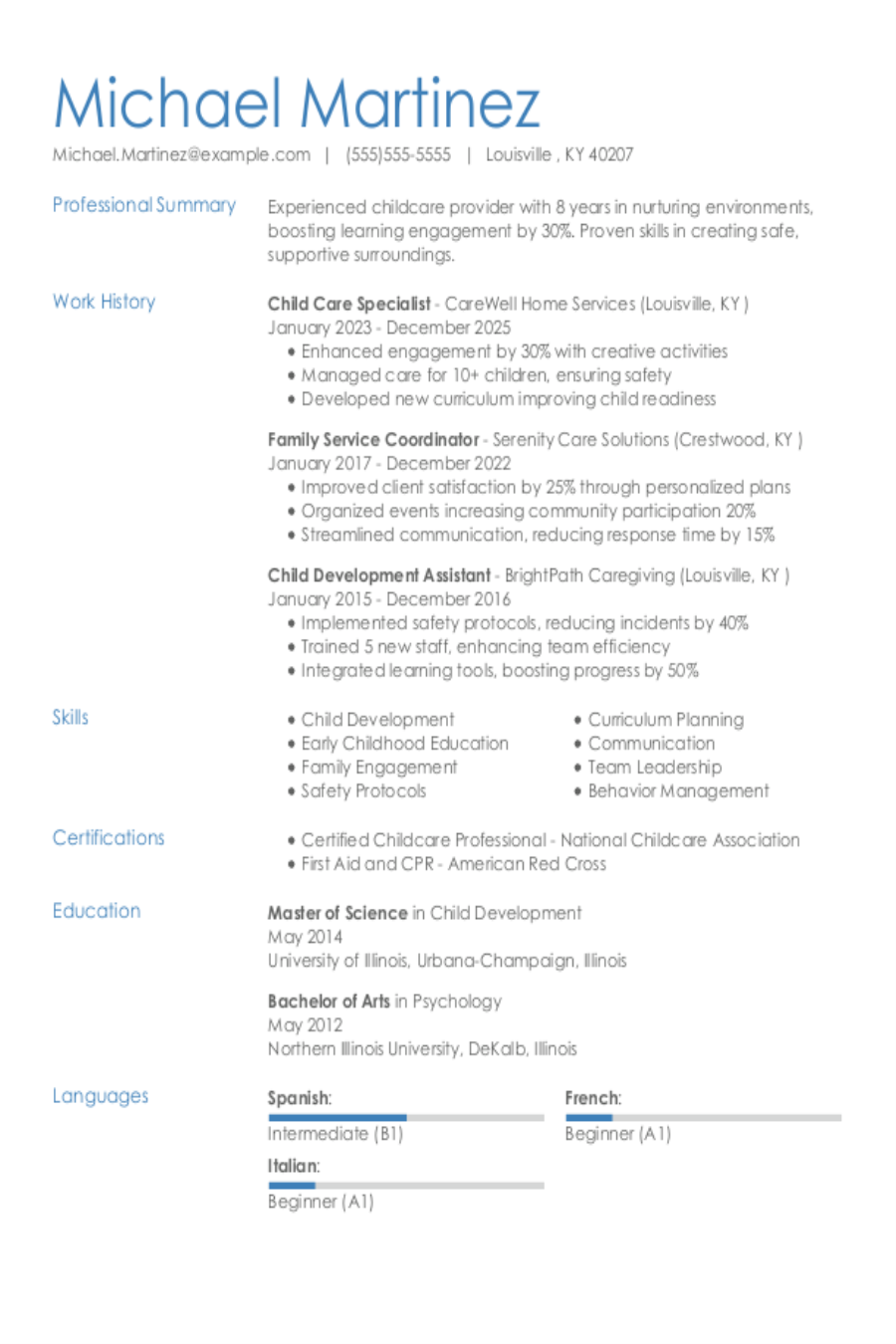Popular Dialysis Technician Resume Examples
Entry-level dialysis technician resume
An entry-level resume for a dialysis technician should highlight relevant certifications, clinical training, and skills like patient care, technical ability, and teamwork to make a strong impression.
Focuses on goals: The job seeker demonstrates a strong dedication to professional growth, evidenced by effective patient education and equipment management skills that improve compliance and satisfaction levels.
Emphasizes soft skills: This resume highlights the applicant's strong soft skills, including patient education and team collaboration, which effectively compensate for limited experience.
Mid-career dialysis technician resume
A mid-career dialysis technician resume should emphasize a combination of hands-on experience, technical skills, and ongoing education to demonstrate professional growth and readiness for advanced responsibilities.
Includes mix of skills: This resume effectively highlights a mix of technical skills in dialysis procedures and equipment maintenance alongside strong interpersonal abilities in patient care and team collaboration.
Encourages quick scanning: A clean and organized layout highlights the job seeker's extensive experience in dialysis care, making it easier for hiring managers to quickly identify key qualifications and achievements.
Experienced dialysis technician resume
An experienced dialysis technician resume should prioritize highlighting relevant skills, certifications, and specific contributions to patient care that demonstrate professional growth and expertise in the field.
Quantifies achievements: This job seeker's achievements, such as managing over 20 patient care schedules weekly and improving satisfaction by 15%, are clear and effective with quantifiable data that highlights their effectiveness and commitment to excellence.
Optimized for ATS: The resume features a clean and professional template that integrates an effective header with an ATS-friendly resume format, improving visibility for both recruiters and automated systems.
No experience dialysis technician resume
A resume for an applicant with no experience as a dialysis technician should highlight relevant skills, certifications, and any volunteer work to showcase the applicant's commitment and preparedness for the healthcare environment.
Overcomes lacking experience: Incorporating volunteer work related to patient care, illustrates the job seeker's solid understanding of important job functions, thereby compensating for limited practical experience in the field.
Avoids jargon: Job seekers often feel pressured to embellish their experiences with complex terminology or elaborate descriptions. However, this resume's straightforward approach that highlights specific tasks and achievements is much more effective in showcasing their abilities.
More resume examples
Dialysis Technician Resume Template
Looking to improve your career? This dialysis technician resume template serves as a solid foundation—just personalize it with your details to make it uniquely yours.
Aiko Patel
Silverlake, WA 98296
(555)555-5555
Aiko.Patel@example.com
Professional Summary
Experienced Dialysis Technician specializing in renal care management with superior skills in equipment operation, patient satisfaction, and team leadership. Proven track record in efficiency and quality care in high-pressure environments.
Work History
Dialysis Technician
Renal Health Services - Silverlake, WA
April 2023 - October 2025
- Operated dialysis machines for 50+ patients/day
- Improved patient wait times by 15%
- Trained 3 new technicians on equipment protocol
Renal Therapy Specialist
Medline Hospital - Spokane, WA
April 2021 - March 2023
- Conducted dialysis for 20 patients/shift
- Achieved 98% patient satisfaction
- Reduced equipment downtime by 30%
Assistant Dialysis Coordinator
NephroCare Solutions - Seattle, WA
April 2020 - March 2021
- Managed dialysis schedules for 5 units
- Enhanced efficiency by 20% in processes
- Led a team of 8 technicians effectively
Skills
- Renal care management
- Dialysis machine operation
- Patient education
- Medical data analysis
- Equipment troubleshooting
- Procedure adherance
- Record keeping
- Time management
Certifications
- Certified Dialysis Technician - National Kidney Foundation
- Advanced Renal Care Specialist - American Nephrology Nurses Association
Education
Master's in Health Sciences Renal Treatment
University of Illinois Urbana, Illinois
May 2020
Bachelor's in Biological Sciences Biochemistry
Northwestern University Evanston, Illinois
May 2018
Languages
- Spanish - Beginner (A1)
- French - Beginner (A1)
- Mandarin - Intermediate (B1)
Must-Have Skills on a Dialysis Technician Resume
A strong skills section is essential for showcasing your qualifications on a resume.
Healthcare and medical professionals make a direct impact on individual and community well-being. The skills you highlight should reflect your ability to deliver dependable support and uphold high standards. Your resume is a chance to show how you contribute meaningfully to quality care and positive outcomes.
The following data highlights the most prevalent hard and soft skills relevant to dialysis technicians, derived from Resume Now’s internal resume data.
When you’re ready to improve your resume with skills, try our AI Resume Skills Generator. It offers tailored suggestions based on your job title, helping you create a comprehensive and customized skill profile.
Writing Your Dialysis Technician Resume
Now that you've explored effective resume examples, you're equipped to learn how to write a resume. We'll guide you through each section step by step, ensuring clarity and confidence in your application.
List your most relevant skills
An effective skills section on your dialysis technician resume should focus on both technical abilities, such as machine operation and patient care, and essential soft skills like empathy and teamwork. This section gives you the chance to present how your expertise meets the demands of the role by aligning with keywords from the job listing.
Tailor your skills section by carefully incorporating relevant terms used in job descriptions. By matching your language with what recruiters prioritize, you improve your chances of standing out to them. Using these keywords from the job listing not only makes it easier for human reviewers to identify you as a suitable applicant but also ensures that applicant tracking systems recognize your qualifications effectively.
Example of skills on a dialysis technician resume
- Proficient in operating dialysis machines to ensure patient safety and comfort
- Experienced in monitoring patient vitals and adjusting treatment as needed
- Compassionate communicator skilled in building rapport with patients and families
- Strong attention to detail with excellent record-keeping and reporting skills
A strong skills section is important for showcasing your readiness as a dialysis technician. It should combine the technical skills specified in the job description with essential soft skills, illustrating your complete preparation to excel in this role. This balance will help demonstrate to employers that you are well-equipped to handle their expectations.
Highlight your work history
The work experience section of your dialysis technician resume is your chance to demonstrate the impact you've made in previous roles, whether through improving patient outcomes or streamlining procedures. Use industry-relevant keywords throughout to resonate with hiring managers.
Each job entry should clearly state your title, the employer's name, and the dates of employment. These details are essential as they help employers verify your professional timeline and understand where you gained your experience. Additionally, emphasize any certifications or specialized training that further establish your expertise as a dialysis technician.
Example of a dialysis technician work experience entry
- Dialysis Technician
HealthCare Partners - Nashville, TN
March 2019 - Present - Operate dialysis machines and monitor patients during treatment, ensuring a safe and effective process for over 50 patients weekly
- Educate patients on post-treatment care and dietary restrictions, improving patient compliance by 30%
- Collaborate with healthcare team to assess patient needs and adjust treatment plans, improving patient outcomes by 15%
- Maintain accurate records of treatments and machine maintenance, contributing to a 98% compliance rate with health regulations
- Train new technicians in safety protocols and equipment handling, reducing incident rates by 25%
Quantifying achievements as a dialysis technician is vital for illustrating your impact on patient care and operational efficiency. For example, stating that you reduced patient wait times by 20% while maintaining safety standards highlights your effectiveness and commitment to improving the dialysis experience.
Include your education
The education section of your dialysis technician resume should present your academic credentials in reverse-chronological order, starting with your most recent qualification. Include relevant diplomas and certifications while omitting your high school diploma if you have completed a higher degree or certification program.
If you are currently enrolled in a program or have not completed a degree, list the highest level of education achieved along with any expected graduation dates. It is beneficial to include bullet points that detail relevant coursework or training experiences that show your qualifications as a dialysis technician.
Common certifications for a dialysis technician resume
- Certified Hemodialysis Technician (CHT) – Nephrology Nursing Certification Commission (NNCC)
- Certified Clinical Hemodialysis Technician (CCHT) – National Nephrology Certification Organization (NNCO)
- Advanced Dialysis Technician (ADT) – American Association of Kidney Patients (AAKP)
- Dialysis Patient Care Technician (DPCT) – Board of Nephrology Examiners Nursing and Technology (BONENT)
Sum up your resume with an introduction
Creating a strong profile section in your resume is essential for making an excellent first impression. It serves as your introduction, summarizing who you are and what you bring to the table.
If you're an experienced job seeker, using a professional summary is the way to go. This format allows you to showcase your most significant achievements and relevant skills right at the top of your resume. If you haven’t built up much experience yet, add a resume objective that speaks to your passion for career growth.
Professional summary example
Compassionate dialysis technician with over 5 years of experience in providing high-quality patient care in clinical settings. Demonstrated expertise in operating dialysis machines, monitoring vital signs, and ensuring patient comfort throughout treatment sessions. Committed to improving patient outcomes through careful attention to detail and effective communication skills.
Resume objective example
Enthusiastic dialysis technician eager to apply strong technical skills and compassionate patient care in a supportive healthcare environment. Committed to improving patient experiences through effective communication and careful attention to detail while continuously pursuing professional growth in the field.
As a dialysis technician job seeker, your resume profile should be concise yet rich in key information. Aim to keep it within three sentences, focusing only on the most relevant details about your skills and experience. You can effectively communicate any additional insights in your cover letter.
Add unique sections to set you apart
Optional resume sections can improve your application by highlighting unique qualifications that set you apart as a dialysis technician. These sections provide an opportunity for you to showcase experiences and attributes that may not fit into the standard resume format.
Including relevant hobbies or volunteer work can reveal different aspects of your professional background. For example, if you’ve volunteered at health clinics or participated in community health initiatives, it shows your commitment to patient care and well-being. Such details not only reflect your values but also demonstrate skills applicable to the dialysis technician role, making your resume more compelling to potential employers.
Three sections perfect for a dialysis technician resume
- Languages: As a dialysis technician, effective communication plays a key role in patient care. Highlighting language skills on your resume shows your ability to connect with diverse patients, improving their comfort and understanding during treatments.
- Volunteer Work: Incorporating volunteer work on a resume not only showcases your professional skills but also highlights your dedication to helping others, making you a more attractive job seeker to potential employers.
- Accomplishments: As a dialysis technician, quantifiable accomplishments highlight your effectiveness in patient care and operational efficiency. Feature these achievements by folding them into your work experience or outlining them in a unique accomplishments section.
5 Resume Formatting Tips
- Choose a format that matches your career stage.
Choosing the right resume format is key to showcasing your skills. If you have significant experience as a dialysis technician, consider using a chronological format to highlight your work history. For those just starting, a functional resume can effectively spotlight your relevant skills and training. A combination resume offers a great middle ground for both seasoned professionals and newcomers.
- Pick a smart resume template.
Choose a professional resume template to improve readability and ensure your information is easy to access. These templates simplify formatting, making the process straightforward, and using ATS-friendly fonts helps you get through automated screenings efficiently.
- Select an appropriate font.
Choose a clear and professional font to improve your resume's readability. Use commonly accepted options like Helvetica, Georgia, or Verdana to ensure your information is easily digestible for both ATS software and hiring managers.
- Use consistent formatting.
Ensure your resume is neatly aligned to the left, with uniform margins. This simple step improves readability and projects a polished, professional image.
- Keep your resume to one or two pages.
When crafting your resume, remember that resumes should be one page long unless you have extensive experience. Keep your content concise and highlight only the most relevant information to make a strong impression.
Tools for Your Job Search
Are you ready to apply for that dialysis technician position you've been eyeing? Before submitting your application, consider using our ATS Resume Checker, which provides essential feedback on how well your resume will perform with the automated systems many healthcare facilities use for initial screening.
Looking to improve your job application? Our AI Resume Builder offers tailored recommendations specifically designed for your background in dialysis technology, along with professional templates that showcase your skills and experiences effectively.
Frequently Asked Questions
Last Updated: October 28, 2025
Absolutely. A cover letter is important as it provides additional context to your resume and creates valuable communication opportunities with employers. It’s your chance to express your passion for the dialysis technician role and demonstrate how your unique skills make you an ideal applicant. So, don’t hesitate—write a cover letter that highlights your strengths.
For a hassle-free way to create a personalized cover letter, try our AI Cover Letter Generator. It allows you to generate tailored letters in just minutes and offers various cover letter template options that perfectly match your resume, ensuring a polished and professional application package.
A resume is usually a concise document, spanning one to two pages, that highlights your most relevant work experience and skills. In contrast, a CV (curriculum vitae) can be several pages long and provides an in-depth account of your academic qualifications, research contributions, publications, and professional experiences.
You typically need a CV for specialized positions in academia or fields such as law and medicine. If you're unsure which document you should use for your next application, our online CV Maker is here to help! With various CV templates tailored to different industries and career levels, you can quickly create a personalized CV that stands out.
A dialysis technician resume should generally be one page long. This length is often sufficient to showcase your skills and experience. However, if you have extensive qualifications or a diverse background, you might consider using a two-page resume to provide additional details about your professional journey.
Choosing the right resume format is key to showcasing your qualifications. Inexperienced job seekers often find success with a functional format, which highlights relevant skills over work history. For seasoned professionals, the chronological format works best as it showcases a solid employment record. Mid-level applicants may prefer a combination format, mixing both experience and skills to present a well-rounded profile that appeals to employers.
Practice common job interview questions and answers to boost your confidence. The more you prepare, the better equipped you'll be to handle any surprises that come your way during the interview.
To excel as a dialysis technician, prioritize continuous learning. Pursue certifications that improve your skills, join professional organizations for networking, and stay updated on the latest advancements in dialysis care through industry publications and online courses. Engaging in these activities will showcase your commitment to growth.
Was this information helpful? Let us know!
Hailey is a career advice writer dedicated to helping job seekers excel in their careers.
More resources

63% Expect AI’s Role in Compensation to Grow Significantly in the Next 5 Years
Resume Now s latest report examines how workers are responding...

How to Include Research Skills on a Resume: 40+ Examples
Check out our guide to understand what research skills are and...

How To Write a CV: The Ultimate Guide for 2025
Here is a complete and comprehensive guide to writing a CV ev...

Interview-Winning Entertainment Resumes Examples and Tips
Was this information helpful? Let us know ...



